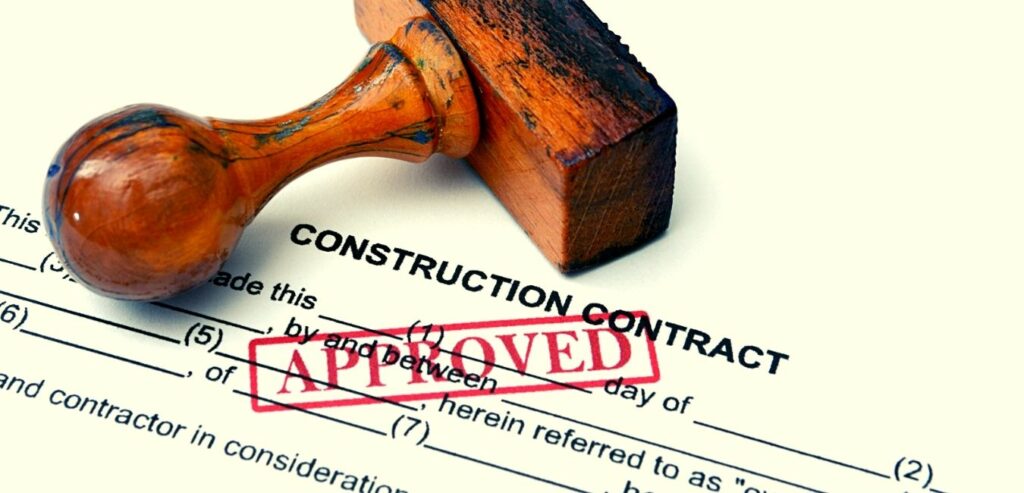Whether you are a client, contractor, or subcontractor, learning negotiation skills can spell success or doom for your business. Learning negotiation of construction contracts ensures both the client and contractor are in a win-win position in terms of service delivery and the business's profitability.
Poorly negotiated contracts can affect the quality of a project, the working relationship between the stakeholders, and future business referrals. A well-negotiated contract means that all parties accept the risks and returns in the business.
Table of Contents
Why is the negotiation stage critical?
Construction negotiation can be nerve-wracking, but good negotiation skills move a contract from skillful to artful. The negotiation typically starts before the contract award, where the contract administrator makes the intentions clear in the bid form outlining the conditions necessary for accepting the contract.
In different stages of construction, the negotiation may be led by the cost consultant, project manager, architect, or contract administrator,
The negotiation stage is crucial as it allows parties that have conflicting interests in the form and content of a contract to come to some degree of compromise and draft an agreement that is acceptable to all parties.
Another essential element of this stage is that it outlines the contract's structure and plan. This lays the proper foundation for a successful project, helps save money, and avoids conflicts.
It outlines the owner's performance requirements, the project's intended use, and the aesthetic statement the owner wants to make.
Negotiation also outlines the chief obligations of a contractual agreement and gives clarity and transparency to the expected views of the involved parties.
The root of most conflicts in construction are finances, and the negotiation of contracts helps outline the total cost of services, mode of payment, and payment schedules. All the involved parties foresee and prepare themselves for future risks and liabilities that are likely to occur.
Negotiation is key to building long-term relationships between the client and contractor.
What elements might need negotiating?
Underlying business considerations tend to fuel contract negotiations. Some of the essential elements to consider are:
1. Contract sum and payments
The contract sum is the price the contractor agrees to before entering into a contract. The involved parties need to negotiate the contract price to agree on fluctuations, variations, statutory fees, losses, and expenses.
The contract's price can also be affected by the timing of payment, the project delivery system, the responsibility for losses, and risk allocation.
A creative negotiator will identify all these price points and negotiate the contract accordingly to agree with contingency usage, savings, and other assumptions that may drive the project prices up.

2. Scope of work
The scope of work refers to the outcomes and output expected from a project. It outlines the significant milestones, deliverables, program of work, and the end products.
During negotiation, the parties will have to discuss the assumptions, plans, specifications, and conditions upon which the work scope is based. There is also a need to identify which scope of work is a part of the original bid and if there is additional work, what qualifications apply?
There is also a need to negotiate change orders. Here the team will negotiate the events that qualify for change orders and if they allow for compensation or an extension of time. Change orders can significantly impact the price point and shift risks.
3. Schedule and timing
Schedule negotiations affect the timing of the work, such as the guaranteed duration of work and circumstances that warrant an extension. A contractor should have complete control of the schedule, as there is a need to change the schedule if necessary.
The scheduling of a project also affects the payment schedule, and it would help if the parties came with clear payment terms of the project. Depending on the agreed-upon schedule, additional compensation may be necessary to cover costs of expedited shipping, fabrication, overtime, and delays.
4. Risk allocation
Essentially, most negotiation clauses are on handling risks in a project, but some contractual clauses need to address the unprecedented risks expected in a contract. These include the case of unexpected site conditions, indemnity clauses that address the risk of property damage and physical injury, and insurance clauses.
Risks need to be negotiated to limit them to acceptable levels for both parties entering into a contract.
5. Insurance, warranties, and bonds
Some contracts have insurance clauses that do not necessarily provide the workers with the insurance they seek. Therefore, it is necessary to negotiate on these clauses and include indemnification clauses for insurable items.
Insurance also goes hand in hand with legal counsel, as various jurisdictions have differences in the enforceability of insurance terms.
Warranties and bonds involve different entities, and the best strategy in negotiation is to have a definite beginning and ending dates for your warranties. It will help if you are also careful about labeling your repair works as warranties instead of punch list work.
6. Conflict resolution
The parties also need to discuss methods of conflict resolution. In some jurisdictions, arbitration is costlier than filing lawsuits. Delays and payments are significant sources of conflict, and during negotiation, the parties should identify all possible factors causing delays and the compensation that should be paid.
If a contractor causes delays, there need to be clauses in the contract with set limits on money and time required for the contractor to pay liquidated damages.
7. Testing and inspection
Testing and inspection are a part of the controls to ensure a project's quality complies with the required specifications. The parties need to agree on the testing procedures, the compliance regulations, the defects liability period, and the schedule and rectification of defects.
Contracts need to indicate who is responsible for the inspection, the contractor's responsibility, and the terms of engagement that lead to court action.

Top 10 Points to consider when negotiating
When considering contract negotiations, you need to consider the following points as they affect the outcome of the negotiation process.
1. State by-laws
Knowing different state by-laws helps you have the upper hand in negotiation. State by-laws also affect some aspects of a contract, such as insurances, bonds, and warranties.
When both parties are aware of specific state requirements, they can quickly come to agreeable terms.
2. Risk
Risks are ever-present in construction projects. Most owners prefer shifting the risks to the General contractor, and the general contractor pushes the risk to the subcontractors. Since no one wants to fully bear a project's risk burden, addressing it beforehand is a negotiation tactic that will satisfy all the parties involved.
Placing too much risk on either party will delay the schedule and alter the project cost.
3. The owner's needs
Lack of attention to the owner's requirements is highly likely to result in disputes. Therefore, it is best to understand the owner's needs, the critical start and end dates of the project, and the owner's operational goals.
Misunderstanding the owner's needs can considerably slow down a project and inflate the project's budget.
4. Change order process
The change order process is contentious, especially for inexperienced owners or general contractors. During negotiation, it is best to point out the change order process, as this will help reduce disputes that are likely to occur as the project progresses.
5. Insurance
As a general contractor, it would be best to ascertain that a project owner's insurance provider can comply before agreeing to their terms. The project manager should work closely with the insurance advisor to ensure that the owner and general contractor are on the same page.
The contract also has to specify who carries the insurance, the type and limits of insurance, and the amount of the deductibles. Coverages for consideration include worker compensation, contractor's risk, design errors and omissions, pollution insurance, and project-specific insurance.
Industry practices always put a cap on the insurance amounts. Therefore, the owner should consult with an insurance provider to ensure they get the appropriate insurance provisions.
6. Realistic cost estimates and project schedule
There is no substitute for an accurate cost estimate. It is best to develop a reasonable cost estimate reflecting the owner's performance requirements, highlighting the unknowns and contingencies, and itemizing probable costs.
A realistic schedule also allows time for contingencies.
7. Dispute resolution
Another vital point to consider is the dispute resolution methods that apply in a project. All stakeholders need to understand the value of mediation and develop the best structure suitable for all parties to avert disputes.

8. Pending tariffs
Early in the contract negotiation process, developers need to consider the status of pending tariffs and how they affect current projects. They need to assess how provisions in a contract help combat changing market conditions that can derail a potentially successful project.
Change of laws and force majeure can affect a developer's ability to meet the demands of original contract documents. Carefully crafted contractual documents are like an investment in a project and affect the expected outcome.
9. Pending litigation and arbitration matters involving the contractor
It is easy to determine if a contractor has pending litigation issues in court. However, since most contractors insist on arbitration as the sole dispute resolution method, most of these records are not available publicly.
Therefore, a project owner should request a certified list of matters from a potential contractor to give them a better view of how it can potentially affect the success of a project.
10. Recovery of damages
Damages are majorly from delays, and most of them lead to lost profits. However, most construction contracts waiver the owner's rights to recover consequential damages. Owners, therefore, need to negotiate their right to recover consequential damages.
What attributes help when negotiating?
The contract negotiation process goes back and forth to help all parties reach an agreement. A fair contract helps protect the interests of the parties involved.
Some attributes in negotiation make the process smooth. Below are some of the skills a savvy contract negotiator needs.
One important skill is listening. During negotiation, all parties want their voices heard. Talking less and understanding the customer's needs help the conversations develop and allow parties to understand each other's needs.
Another critical skill is bargaining. Once you give up something in a negotiation, it can be hard to get it back. If there's money on the line, start high, and work down to a comfortable position.
It is also important to make the process collaborative where all parties walk from the negotiating table feeling good about the deals made. When all parties feel considered, it promotes productive dialogue.
Before entering negotiations, you need to prepare well. It would be best to have detailed cost estimates, an understanding of the jurisdiction by-laws, and project scope, as these factors help you negotiate from an informed position. It is also best to assess previous contracts and their most prevalent friction points.
You also need to have a good memory and engage in candid discussions. This helps you note down all the points of concern in a project and helps come up with acceptable resolutions for contentious issues.
It would also help if a negotiator is persuasive, efficient at handling stress during negotiation, and has a good intuition of the opposite's party approach to problems. It is also crucial for the negotiator to gain the other party's trust and be willing to concede and be flexible if necessary.
What happens after the negotiation stage?
After negotiation, the contractor can either accept or reject the offer. The contract administrator will coordinate and prepare a contract report if the parties reach an agreement. The client will then assess the tender report and instruct changes to the tender documents.
Summary
Negotiation of construction contracts helps all the involved parties of a project come to agreeable terms. Now that you understand what happens during construction negotiation, you can employ these tactics to get fair contracts.
Understanding contract clauses that directly affect you help you develop creative compromises that serve all parties in a contract. Successful negotiation skills can have a considerable impact on the profitability of a business.

